Thursday, March 18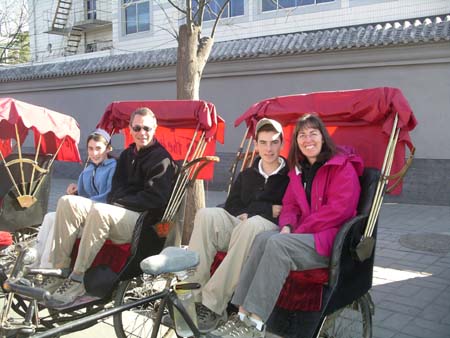
Steve: What we expected to be a morning spent exploring one of Beijing's authentic hutongs became for us primarily a humorous and in some ways sad view into China's tourism engine. Hutongs are historic cities, often up to 700 years old and consisting mainly of enclosed quadrangles that provided housing for residents. Many of these hutongs have become very desirable due to their proximity to Beijing's city center and their relatively quiet streets. Our itinerary for the morning called for a rickshaw ride through a hutong, an opportunity to visit a local family, a visit to a kindergarten class and a demonstration of a traditional tea ceremony. It sounded great!
When we arrived at the hutong, we quickly saw what this was all about. The entire street was lined with red-canopied rickshaws all blazed with "Beijing Hutong Tourist Agency" in big letters. Scores of drivers stood by, waiting for the next load of tourists to show up. Large buses were being efficiently escorted to a nearby parking lot. Ugh.
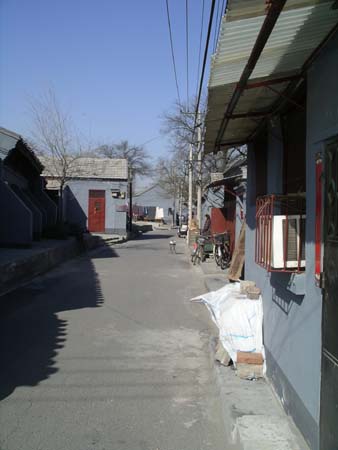 We
were quickly greeted by our young tour guide (a "local guide", since
these are the only ones permitted by the government to give tours in the hutong),
seated in two rickshaws, and taken into the hutong. After a few minutes riding
through residential streets, we stopped for a quick walk past several homes.
Our guide explained a little about how people live here today, focusing on
the symbolism represented by various types of doors and their decorations.
We also learned that many of the quadrangles have been sold to foreigners
who come in with large sums of money, but that the 47% property sales tax
levied by the government makes it difficult for people to cash in on the appreciated
values of their homes.
We
were quickly greeted by our young tour guide (a "local guide", since
these are the only ones permitted by the government to give tours in the hutong),
seated in two rickshaws, and taken into the hutong. After a few minutes riding
through residential streets, we stopped for a quick walk past several homes.
Our guide explained a little about how people live here today, focusing on
the symbolism represented by various types of doors and their decorations.
We also learned that many of the quadrangles have been sold to foreigners
who come in with large sums of money, but that the 47% property sales tax
levied by the government makes it difficult for people to cash in on the appreciated
values of their homes.
Our first stop was in a family's home to for what our brochure called an opportunity to be "inside a quadrangle with the ordinary Beijing residents' homes." Our guide rang the doorbell, and we went inside, almost brushing shoulders with the prior tour group whose time was up and was being escorted out. This home is lived in by a Mr. Wu, his wife, two of their sons, their wives and a granddaughter. It's a comfortable and modest home, with a relatively small living area (of course, it was hard to judge how "typical" it really is, since Mr. Wu obviously has a nice little contract with the tourist agency).
Mr. Wu is a soft-spoken older man, and we were given an opportunity to engage
him in conversation (we started by asking a question, but were told by our
guide that we needed to wait until he gave us an overview of his home…).
After hearing about the history of the house (all 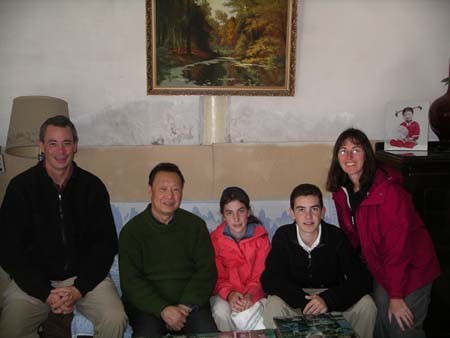 translated
by our guide), we began asking questions about his perspective on life here.
We first expressed admiration of a cute picture of his granddaughter, and
laughed when Mr. Wu told us that the picture was from 5 years ago - he informed
us that now "she's fat"! We then started with some of the basics
translated
by our guide), we began asking questions about his perspective on life here.
We first expressed admiration of a cute picture of his granddaughter, and
laughed when Mr. Wu told us that the picture was from 5 years ago - he informed
us that now "she's fat"! We then started with some of the basics
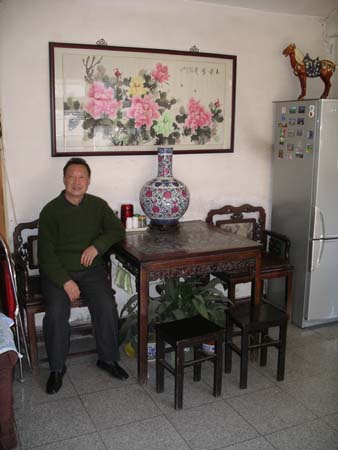 (about
his family and career), but quickly decided to pursue some more interesting
avenues since we knew our time would probably be very limited. Our query into
what he believes are the biggest challenges facing China today was met with
an answer along the lines of: "I really don't know - that's for our government
to worry about." We also asked him about access to information regarding
world events - he confirmed that television stations are limited to those
approved by the government (i.e. no CNN allowed), but that he's content with
the amount of news he receives from the government-sponsored stations. It's
difficult to say how representative his seemingly submissive attitude is among
other Chinese from his generation, but from what we have seen during our short
visit to Beijing, we wouldn't be surprised if this were the case.
(about
his family and career), but quickly decided to pursue some more interesting
avenues since we knew our time would probably be very limited. Our query into
what he believes are the biggest challenges facing China today was met with
an answer along the lines of: "I really don't know - that's for our government
to worry about." We also asked him about access to information regarding
world events - he confirmed that television stations are limited to those
approved by the government (i.e. no CNN allowed), but that he's content with
the amount of news he receives from the government-sponsored stations. It's
difficult to say how representative his seemingly submissive attitude is among
other Chinese from his generation, but from what we have seen during our short
visit to Beijing, we wouldn't be surprised if this were the case.
Just as we began to cover some additional topics with Mr. Wu, the doorbell
rang and we immediately knew what that meant. We were quickly escorted out
of the quadrangle to make way for the next visitors, and Mr. Wu got ready
to give his spiel again…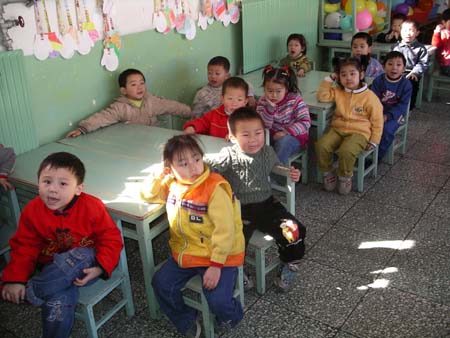
Next was a public kindergarten, consisting of three age groups of children starting at age four. As we entered the first classroom, the teacher immediately sat at her piano and the children responded by promptly breaking into a well-rehearsed song. We were only modestly surprised to hear them singing Christmas music. At one point, the children approached us and engaged us in a dancing routine. This process was repeated in two more classrooms of kindergartners - each time we entered the children would obediently drop what they were doing and begin singing their songs.
The only really interesting thing about this was a comment that a teacher
made in passing to our guide. She mentioned how jealous she was seeing us
with two children (referring to the law prohibiting the Chinese from having
more than one child). This 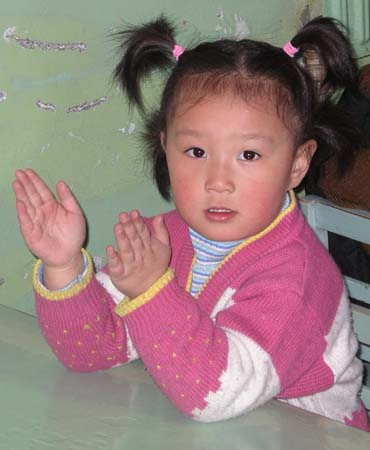 made
us feel sorry for her, and we asked our guide about her personal opinions
about this. She indicated that she personally didn't want children, but did
plan to marry when she reached the legal age. She then asked us when people
can get married in America, and was shocked to hear that we have no such laws.
made
us feel sorry for her, and we asked our guide about her personal opinions
about this. She indicated that she personally didn't want children, but did
plan to marry when she reached the legal age. She then asked us when people
can get married in America, and was shocked to hear that we have no such laws.
It was difficult to really enjoy being here or seeing much beyond the children's
staged performances, especially as we watched all the tourists being paraded
through the school today. We wondered how much time these particular children
have to spend "entertaining" the people who are bused here constantly.
After listening to the obligatory performance by each of the three classes,
we were escorted back to our waiting rickshaws.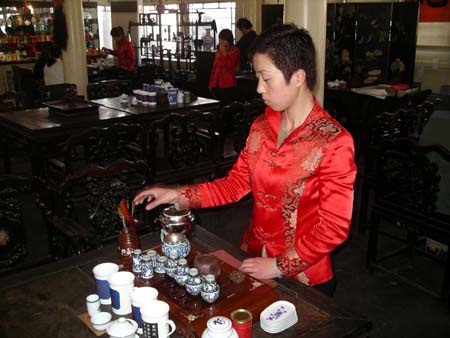
The rest of our time in the hutong was much of the same. We walked through a garden area, and then into a tea room where we received a demonstration of a traditional tea ceremony. This was actually kind of fun, and we enjoyed tasting several varieties of tea and following Chinese customs regarding smelling the leaves, holding the teacups, and drinking the tea. Of course, we were shown into the on-site store, and obliged by buying two (overpriced) varieties of tea.
After our morning "tour", it was difficult not to compare our experiences visiting families and kindergartens in other countries with what we were subjected to today. Perhaps we're being too hard on today's show based on some of the wonderfully authentic opportunities we've had in India and Southeast Asia, but the differences provided an interesting education into one component of China's approach to tourism.
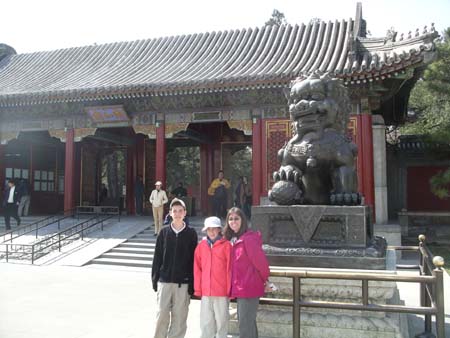 This
afternoon we went to the Summer Palace, a huge park that was used by China's
emperors during the warmer months. Similar to the Forbidden City, the Summer
Palace contains a business area, gardens and residential quarters. It's much
larger and wraps a lake, and today looks more like a public park. We enjoyed
strolling through the grounds, and used the time to engage Shu in additional
dialogue about life in Beijing. One topic that we found particularly interesting
is the dislike that people from Beijing and Shanghai have for each other.
Beijing people consider those in
This
afternoon we went to the Summer Palace, a huge park that was used by China's
emperors during the warmer months. Similar to the Forbidden City, the Summer
Palace contains a business area, gardens and residential quarters. It's much
larger and wraps a lake, and today looks more like a public park. We enjoyed
strolling through the grounds, and used the time to engage Shu in additional
dialogue about life in Beijing. One topic that we found particularly interesting
is the dislike that people from Beijing and Shanghai have for each other.
Beijing people consider those in 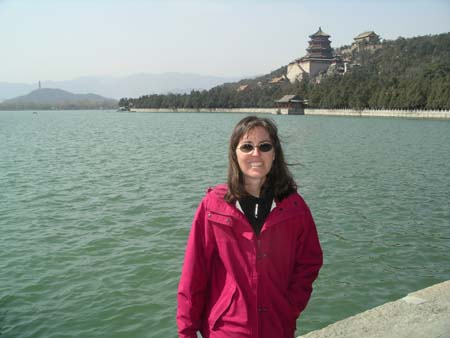 Shanghai
to be focused on making money, and nothing else. Shanghai has grown extremely
rapidly, much more so than Beijing. The people from Shanghai think of Beijing
as old-school, slow to change and mired in government regulation. It was interesting
to compare this dynamic to other countries where similar two-city situations
exist (St. Petersburg vs. Moscow is one example, as is Hanoi vs. Ho Chi Minh
City).
Shanghai
to be focused on making money, and nothing else. Shanghai has grown extremely
rapidly, much more so than Beijing. The people from Shanghai think of Beijing
as old-school, slow to change and mired in government regulation. It was interesting
to compare this dynamic to other countries where similar two-city situations
exist (St. Petersburg vs. Moscow is one example, as is Hanoi vs. Ho Chi Minh
City).
Next we met Sarah at her favorite store in Beijing. Yesterday we told Sarah
that we were looking to buy some unique souvenirs from China, and she quickly
told us about this fascinating little shop. It's owned by 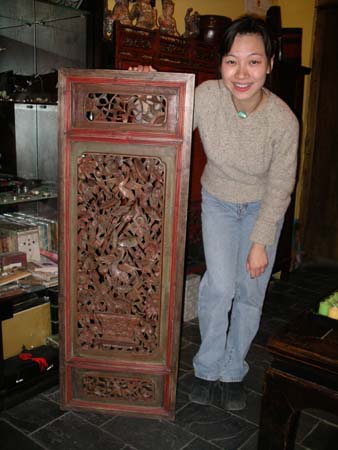 Rebecca
(obviously her Americanized name) who travels across the country buying a
variety of antique carvings, statues, jewelry, boxes and other assorted items.
Although small, Rebecca's store is filled with wonderful items and we had
no problem settling on some very special purchases. Our favorite is a large
wooden carving that's over 200 years old and once was used to decorate windows
on the outside of a home. In addition to other assorted items, we also purchased
a stone statue of a lion dated around 1800 - these lions are used to guard
the doors of homes and other buildings.
Rebecca
(obviously her Americanized name) who travels across the country buying a
variety of antique carvings, statues, jewelry, boxes and other assorted items.
Although small, Rebecca's store is filled with wonderful items and we had
no problem settling on some very special purchases. Our favorite is a large
wooden carving that's over 200 years old and once was used to decorate windows
on the outside of a home. In addition to other assorted items, we also purchased
a stone statue of a lion dated around 1800 - these lions are used to guard
the doors of homes and other buildings.
Sarah then took us to one of her favorite restaurants, located right across
the 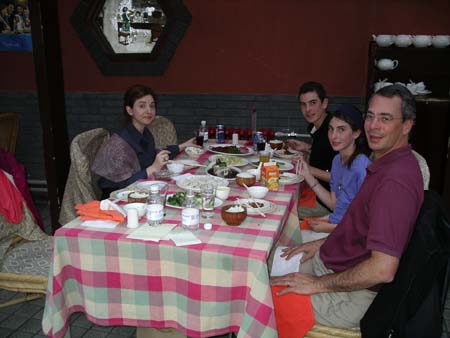 street.
We had an absolutely wonderful meal here - definitely the best so far in China!
With Sarah's help, we ordered a delicious variety of traditional Chinese treats,
including a spicy bean dish, dumplings and a grilled rock fish that were all
fantastic.
street.
We had an absolutely wonderful meal here - definitely the best so far in China!
With Sarah's help, we ordered a delicious variety of traditional Chinese treats,
including a spicy bean dish, dumplings and a grilled rock fish that were all
fantastic.
We now realize how much of a difference there is between the food that we
call "tourist food" and the genuine local restaurants. Unfortunately,
we've had way too much of the tourist food here (much of which is already
planned and paid for in our itineraries). Typically, these places serve the
food that the Chinese think will best suit Western tastes, including a heavy
dose of "sweet and sour" dishes. Normally you sit down, are informed
that there's a wonderful "set menu" that's been arranged, and within
five minutes the table is filled with a variety of uninteresting and often
mediocre pre-prepared selections. We're also normally informed that we are
entitled to one glass of mineral water or soda - any more and it costs extra.
Of course, many of these restaurants have their own souvenir and craft stores.
For the rest of our time in China, we 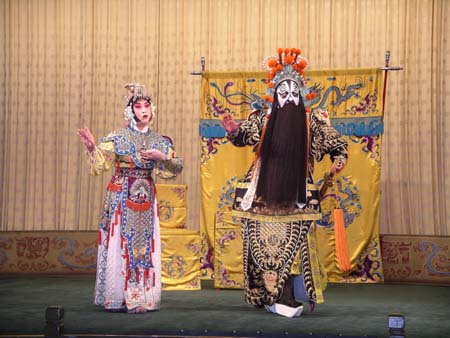 plan
on avoiding these places as much as possible, even if it means having to pay
for a meal somewhere else instead of the places we've already paid for.
plan
on avoiding these places as much as possible, even if it means having to pay
for a meal somewhere else instead of the places we've already paid for.
We had a great time with Sarah, and have made her promise to come visit us on Cape Cod this summer. She has lots of family in the Boston area, so we're hopeful that this will work out.
Our final event for the day was a performance of Peking opera at a local hotel. This hour-long show was meant to provide a flavor of what this ancient art form is all about. It's a combination of colorful costumes, traditional Chinese music, and dance and acrobatic routines.
Tomorrow we have an early-morning flight to Xi'an, home of the famous terracotta soldiers.
